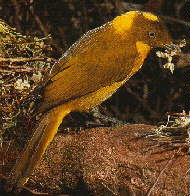|
GOLDEN BOWERBIRD

Photo: C & D Frith
Australian Tropical Birds

ENDEMIC Tropical North QLD
GOLDEN
BOWERBIRD
Prionodura
newtoniana 24 cm
·
The Golden Bowerbird is one of 12 bird species
endemic to the Wet Tropics
region.
·
It is restricted to upland rainforests, where it is
numerous above 900 metres
altitude.
·
Males in adult plumage, attained about 7 years of
age, may occupy a traditional
bower site.
·
The average period of ownership in a study of 46
bowers was 7 years. Some
sites have
been occupied by a succession of males for several decades.
· The bower is usually about two metres tall and
constructed around two trunks of
saplings connected loosely by a fallen branch.
The branch and the towers of
sticks on each side are decorated with lichens and pale flowers or fruits.
·
An endemic to Australia, the Golden Bowerbird can be seen in Queensland from
just
south of Cooktown to Paluma, generally at altitudes between 900 and 1500m,
but sometimes
as low as 700m.
· It is the world’s smallest bowerbird, but it is able to build the largest of
all bowers.
The bower represents external symbols of an individual male’s fitness.
·
The male Golden Bowerbird builds a maypole type of bower of one or two towers
of
sticks up to 3m tall with a display perch. Skilfully laid sticks connect the towers
and
decorations are placed on them. These are often white, off-white and pale
green orchids,
jasmine, other flowers, seedpods and lichens. The sticks become
glued together by the
action of fungi after some time. To maximise the time a male
can spend at a bower, he
hides fruits in different places throughout the bower.
·
The bower is very important to the bird, and rival males may steal higher valued
decorations from each others’ bowers. This is because the females
are
discriminative
– they will only select the male who uses ornaments that are the
rarest or hardest to
obtain.
·
The average life of a bower structure is 9 ½ years, and the same sites are often
used from generation to generation, perhaps for 60 years.
·
The male tries to fertilise as many females as possible during each breeding
season. The females assess the males’ vocals, plumage, displays and bower
structure
before selecting and mating.
·
The mature male is a golden-olive brown colour, with golden yellow underparts,
crown and nape. He has an unusual feather structure that refracts light to produce
pure
white highlights on the plumage. When younger, the male looks the same as
the female. Both
have a golden iris.
·
The female, less conspicuous than the male, is olive-brown with ash-grey below.
She raises the one or two young in a small cup nest in a tree crevice.
·
Some Golden Bowerbirds have lived until they are 25 years old – an
impressive
age for their small size. The male birds will not start to gain signs of adult
plumage
until they are at least 5 years old.
· In the Wet Tropics, it has been
discovered that golden bowerbirds inhabiting
mountain tops just 20km from each
other sing quite different songs. In fact, although
the birds behaved aggressively when
played tapes of local golden bowerbirds, they
did not respond to the songs of birds
from other areas. It is thought that different
populations of these birds, which
inhabit cool wet forests above 900m, became
isolated from each other at the end
of the ice age as the climate warmed and their
type contracted to mountain tops. (Source:
Environmental Protection Agency)
·
The best time to see a Golden Bowerbird is in the wetter months from November
to
January. This is when males are active building bowers and females are
nesting.
·
The Golden Bowerbird eats fruit most of the time, but also beetles and cicadas.
·
Its voice croaks and mimics.
RETURN
TO BIRD INDEX
| 